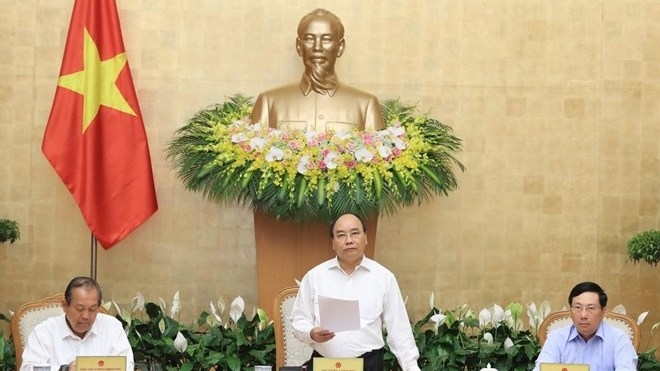


Prime Minister Nguyen Xuan Phuc has resolutely requested that there be no delays in law building in preparation for the upcoming fifth session of the National Assembly (NA) scheduled for mid-May.

Prime Minister Nguyen Xuan Phuc (C) speaks at the meeting (Photo: VNA)
During the government’s monthly meeting on May 3, the PM criticised the slow progress and poor quality of draft laws to be submitted to the NA, and asked the Ministry of Justice and other ministries and agencies concerned to devise specific solutions to fix the issue.
"Building institutions is the top priority of the Government in this term,” PM Phuc said.
Looking back on the past four months, the PM lauded ministries, agencies, and localities for issuing specific action plans to fulfill socio-economic development targets. In particular, the government held four thematic national conferences to address difficulties across socio-economic fields. Through trade promotion forums, increasing inbound and outbound capital have fueled production and trade.
A number of measures regarding socio-culture, the settlement of complaints and denunciations, national defence-security, and especially external relations have proved effective, he said.
The PM noted that macro-economic stability has been maintained during January-April, with the consumer price index for April only rising by 0.08 percent month-on-month, and the four-month index up by only 2.8 percent annually. The total of foreign reserves neared US$ 63 billion while the State Bank of Vietnam bought more than US$ 32 billion in two years, a positive signal for the Vietnamese economy.
Rice output increased by 668,000 tonnes, industrial production index grew by 11.4 percent in four months, and exports soared 20 percent to approximately US$ 74 billion. The trade surplus surpassed US$ 3.39 billion and State budget collection was 12 percent higher than the same period last year, or 33.8 percent of the estimate. Foreign arrivals to Vietnam topped 5.5 million, up roughly 30 percent.
The PM said the business environment has improved with progress seen in administrative reforms, especially in industry and trade, health care, transport, and construction. The provincial competitiveness index has hit a record since 2005, proving that the business climate in localities has been healthier with more than 41,000 newly-established firms during the period.
Localities were hailed for strictly dealing with law violations to protect the environment and strengthen investors’ trust.
On the fight against corruption, the leader said under the drastic direction of the Party General Secretary and head of the Central Steering Committee on Corruption Prevention and Control, the government has exerted great efforts to deal with cases of public concern such as the AVG television channel purchase, land purchase in Da Nang city, and gambling on Internet, thus strengthening public trust under the Party leadership and State management.
The PM pointed out an array of difficulties and challenges that need to be addressed, such as unsustainable macro-economy, low disbursement of construction investment capital from the State budget, and slow attraction of foreign direct investment (FDI).
He said the business environment should be further improved since the market penetration index of Vietnamese enterprises is only at 123rd among 190 nations worldwide.
He requested that investment reforms push ahead, noting that many ministries and departments have yet to proactively reduce administrative procedures, causing difficulties for businesses.
The PM also expressed his concerns over a number of social, cultural, and religious issues and reminded localities to strengthen management in those fields.